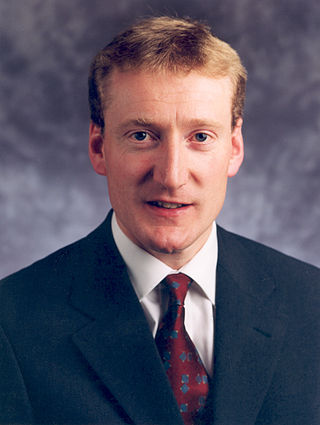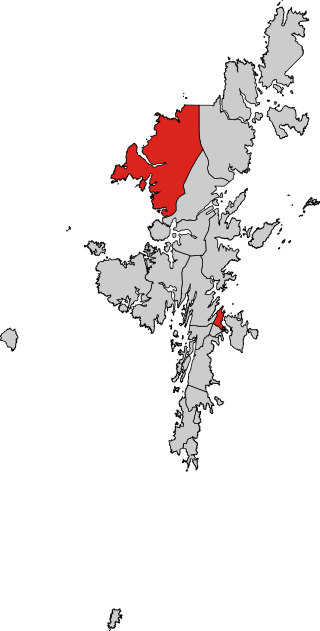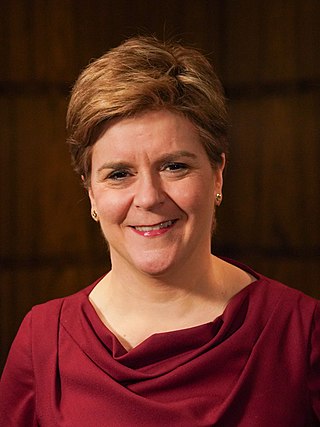Related Research Articles

Local government in Scotland comprises thirty-two local authorities, commonly referred to as councils. Each council provides public services, including education, social care, waste management, libraries and planning. Councils receive the majority of their funding from the Scottish Government, but operate independently and are accountable to their local electorates. Councils raise additional income via the Council Tax, a locally variable domestic property tax, and Business rates, a non-domestic property tax.

Orkney and Shetland is a constituency of the House of Commons of the Parliament of the United Kingdom. It elects one Member of Parliament (MP) by the first past the post system of election. In the Scottish Parliament, Orkney and Shetland are separate constituencies. The constituency was historically known as Orkney and Zetland.

Tavish Hamilton Scott is a former Scottish politician. He was the Member of the Scottish Parliament (MSP) for Shetland from 1999 to 2019, and Leader of the Scottish Liberal Democrats from 2008 to 2011. He stepped down as Leader after the 2011 Scottish Parliament election, in which the Liberal Democrats were reduced to five seats, down from 16 in the previous parliament.
The Orkney and Shetland Movement was an electoral coalition formed for the 1987 general election comprising the Orkney Movement and Shetland Movement, political parties which advocated autonomy for Orkney and Shetland. They agreed on selecting John Goodlad, the secretary of the Shetland Fishermen's Association, as a joint candidate for the Orkney and Shetland constituency. The Scottish National Party agreed to stand aside in favour of the coalition.
The Scottish Liberal Democrats is a liberal, federalist political party in Scotland, part of UK Liberal Democrats. The party holds 4 of the 129 seats in the Scottish Parliament and 6 of the 57 Scottish seats in the House of Commons.

Scotland has elections to several bodies: the Scottish Parliament, the United Kingdom Parliament, local councils and community councils. Before the United Kingdom left the European Union, Scotland elected members to the European Parliament.

Separatism in the United Kingdom may refer to the secession of any of the countries of the United Kingdom from the union. Less significant movements for separatism exist such as Cornwall within England.

The 1994 Scottish regional elections were held in Scotland on 5 May 1994, as part of the Local Government (Scotland) Act 1973. These were the last elections before 29 new mainland unitary authorities, established by the Local Government etc. (Scotland) Act 1994, came into effect. The councils up for election were last contested in 1990 Scottish regional elections, and vote and seat changes are compared to the 1990 results.

Regional elections were held in Scotland on Thursday 6 May 1982, as part of the wider 1982 United Kingdom local elections. Whilst the 1982 elections saw the Conservatives hold up relatively well in England, the Tories did comparatively poorly in Scotland, where their already disadvantageous position worsened. The Conservatives did particularly poorly in Strathclyde, where the Conservative group leader lost his seat.

In the United Kingdom, devolution is the Parliament of the United Kingdom's statutory granting of a greater level of self-government to the Scottish Parliament, the Senedd, the Northern Ireland Assembly and the London Assembly and to their associated executive bodies: the Scottish Government, the Welsh Government, the Northern Ireland Executive and in England, the Greater London Authority and combined authorities.

The 1902 Orkney and Shetland by-election was a Parliamentary by-election held on 18–19 November 1902. The constituency returned one Member of Parliament (MP) to the House of Commons of the United Kingdom, elected by the first past the post voting system.

The island groups of Orkney, Shetland and the Western Isles are all currently regions of Scotland. Their constitutional status has periodically been discussed, for example during the Scottish independence referendum campaign. Currently, they are council areas with the same constitutional status as the other 29 local government areas. The three island councils are the only local authorities among the 32 in the country where independent councillors form a majority.

An election to Shetland Islands Council was held on 6 May 1982 as part of the 1982 Scottish regional elections and yielded a swing to candidates supportive of Home Rule for the islands. Whilst no candidates appeared on the ballot as members of the Shetland Movement, the Shetland Movement did publish a list of candidates supportive of Shetland Home Rule. Ultimately of the 25 members of the Shetland council, 14 were supporters of the movement.
Danus George Moncrieff Skene, Baron of Skene Chief of the Name and Arms of Skene, also 10th of Piltout and 15th of Hallyards, was a Scottish nobleman, teacher, educationalist and politician.

Elections to the Shetland Islands Council were held on 2 May 1978 as part of Scottish regional elections, with 11 seats uncontested. The election saw 14 new councillors enter the Shetland Islands Council, an unusually large number, in part attributable to the charged political context surrounding the devolution debate of the late 1970s. Several of these incomers consisted of members of the pro-autonomy Shetland Group, later to become the Shetland Movement, and local Scottish National Party branch, registered as independents.

Elections to Shetland Islands Council were held on 4 May 2017 on the same day as the other Scottish local government elections. The election was the third using seven wards created as a result of the Local Governance (Scotland) Act 2004, each ward electing three or four Councillors using the single transferable vote system form of proportional representation, with 22 Councillors elected.

Northern England devolution is the broad term used to describe the wish for devolved governmental powers that would give more autonomy to the Northern Counties.

The 2022 Scottish local elections were held on 5 May 2022, as part of the 2022 United Kingdom local elections. All 1,226 seats across all 32 Scottish local authorities were up for election and voter turnout was 44.8%.

Elections to the Shetland Islands Council took place on 5 May 2022 on the same day as the other Scottish local government elections. Seven wards were contested, each ward electing two to four Councillors using the single transferable vote system form of proportional representation, with 23 Councillors elected.
References
- ↑ Dowle, Martin (1981). "The Birth and Development of the Shetland Movement, 1977-1980" (PDF). Scottish Government Yearbooks: 203–221. Retrieved 27 December 2016.
- ↑ Shetland Movement (1981). Leaflet Explaining the Shetland Movement. Lerwick: The Shetland Times.
- ↑ "Shetland home rulers returned". The Glasgow Herald. 8 May 1982. p. 12.
- ↑ Pilkington, Colin (2002). Devolution in Britain today. Manchester University Press. ISBN 0-7190-6076-1.
- ↑ "New 'Wir Shetland' political movement launches | Shetland News". Archived from the original on 15 October 2015.